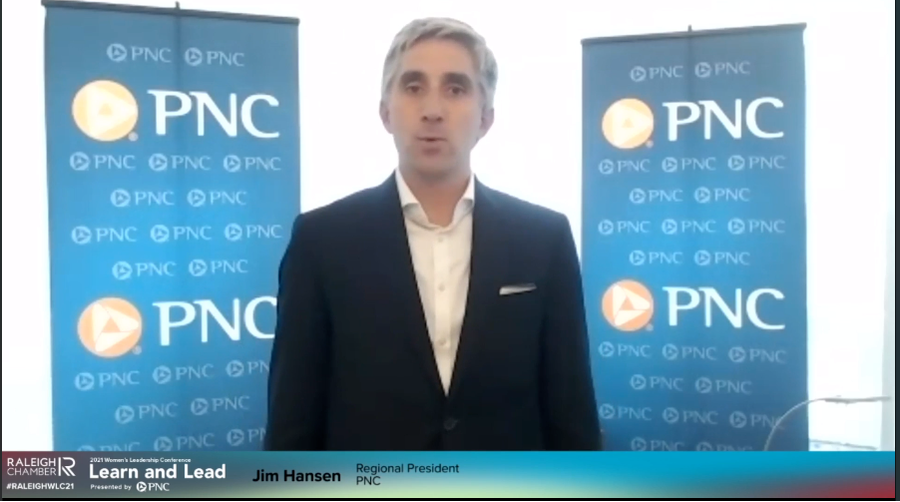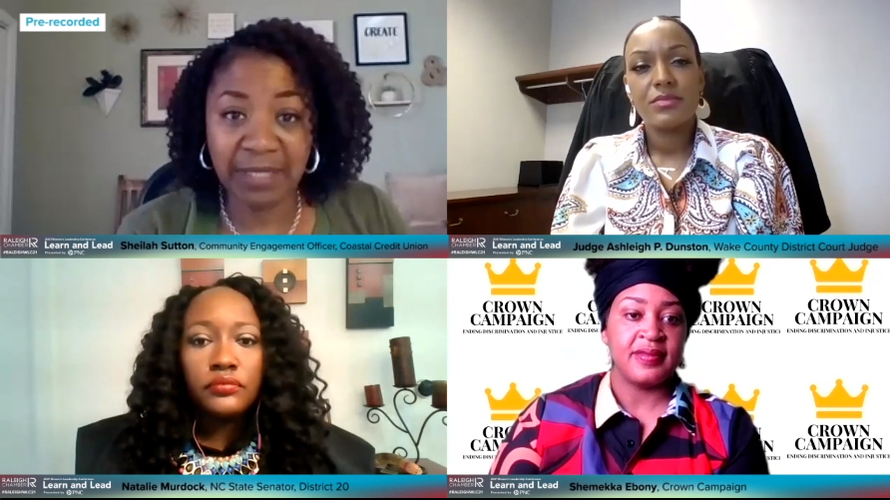|
This year’s Women’s Leadership Conference, presented by PNC, took place virtually over a 2-day period. With the theme of Learn and Lead, there was so much insightful material to be shared. Thank you, PNC, for your sponsorship and support, and to Jim Hansen for being a strong ally. We kicked off day 1 with a panel discussion, “Cultural Differences and Acceptance: I Am Not My Hair!” Once of the best quotes we heard was from Chanae Wilson, "there is a comfortability and confidence that comes with being able to wear your hair in its natural state." Our Panel Included:
Contributors included:
The remainder of day 1 featured breakout sessions for participants to choose 2 of 3 topics:
Day 2 kicked off with, “Modern Workplace (The Burnout Epidemic.)” One of our favorite quotes from this session was, "Open communication is built on the foundation of trust." –Amy Bacon, Senior VP, Enterprise Data Risk Management, PNC Panelists included:
The remainder of day 2 featured breakout sessions for participants to choose 2 of 3 topics:
Thank you to all our Women's Leadership Conference 2021 sponsors who helped make this conference happen! Presenting Sponsor Platinum Sponsors: Gold Sponsors:
ABB Inc. Blue Cross and Blue Shield of North Carolina Credit Suisse Highwoods Properties, Inc. Merz Aesthetics WakeMed Health & Hospitals Silver Sponsors: Bailey's Fine Jewelry Carolina Hurricanes Citrix McAdams Syngenta Crop Protection Wake Technical Community College WakeWorks Apprenticeships Breakout Session Sponsors: Barnes & Thornburg LLP Stewart Bronze Sponsors: Alfred Williams & Company Barnhill Contracting Co., Inc. Girl Scouts - North Carolina Coastal Pines HH Architecture Parker Poe Adams & Bernstein
0 Comments
What’s happening across North Carolina state government? Here’s a recap of bill activity and how these bills may impact your business.
Last week, Gov. Cooper issued Executive Order 216: Reinstating Work Search Requirements for Unemployment Insurance Benefits. Under Executive Order 216, “all existing claimants of unemployment benefits will be required to fulfill work search requirements beginning June 6, 2021. All existing claimants will be required over the next several weeks to register with a jobseeker account on NCWorks.gov.” About 245,000 North Carolina residents are currently receiving unemployment benefits. Executive Order 216 aims to help transition unemployed claimants back to the workforce. Additionally, the North Carolina Senate began discussing House Bill 128: An Act to Reemploy NC’s Workforce. House Bill 128 makes several changes to the unemployment laws of North Carolina, including a $300 signing bonus to unemployed claimants receiving benefits who accept reemployment. Additional return to work incentives would be payable as follows:
The bill is designed to get unemployed individuals back into the workforce. Millions of North Carolinians lost their jobs during the pandemic and heavily relied on unemployment benefits. However, as we are phasing out of the pandemic, local and state government are working to get North Carolinians employed. To learn more about our GA priorities, track legislative bills, or to read our blog posts, you can visit our webpage or follow us on Twitter @RcgaJ, @tierra_rcga, or @raleighchamber. We are proud to announce that Raleigh Chamber, President and CEO, Adrienne Cole has made Business North Carolina’s inaugural Power List.
The list features biographies and commentary by the state’s most influential business leaders. There are 18 industry categories featuring Power List members. Check out the entire list here. Adrienne is on the Economic Development list. Check out the profiles here. Congratulates to everyone that made the list. What’s happening in the North Carolina General Assembly? Here’s a recap of bill activity and how these bills may impact your business.
Last week, the North Carolina General Assembly reached a biennial legislative milestone commonly referred to as the crossover deadline. Under the “crossover deadline”, any bills unrelated to taxes, spending or elections must pass the legislative chamber of their origin before May 13 or they are no longer eligible for consideration going forward. This deadline allows the General Assembly to prioritize the issues that are most likely to receive consideration by either the House or Senate. The House approved more than 350 bills in the months leading up to crossover, as the Senate approved more than 150 bills. The total number of bills introduced in the General Assembly this year exceeded 1,600. One piece of notable legislation that will receive debate in the weeks after crossover is House Bill 947: The G.R.E.A.T Broadband Expansion Act. This act establishes the Completing Access to Broadband Program, creates a fixed wireless and satellite broadband grant, and makes changes to growing rural economies with access to technology. Broadband expansion has been on the forefront of North Carolina’s list of priorities for several years and the need for affordable access has exacerbated since the Covid-19 pandemic. There are numerous counties in the state that do not have complete access to broadband and users that cannot afford access to broadband. This has left students without the ability to engage in virtual learning or have access to virtual resources during the school year. HB 947 will make an additional $400 million allocation to assist all NC counties with access to affordable broadband service. Another notable piece of legislation introduced in the General Assembly last week was House Bill 941: Revenue Laws Tech, Clarifying and Admin Changes. This bill makes technical, clarifying, and administrative changes to the Revenue Laws of NC, as recommended by the NC Department of Revenue. This is important piece of legislation ensures our NC tax laws are encouraging investment while meeting the needs of a growing economy. We will continue to keep you informed on the legislation, and what it means to your business, as it moves through the process. To learn more about our GA priorities, track legislative bills, or to read our blog posts, you can visit our webpage or follow us on Twitter @RcgaJ, @tierra_rcga, or @raleighchamber. What’s happening in the North Carolina General Assembly? Here’s a recap of bill activity from last week.
Over the past two months, the General Assembly introduced two pieces of legislation to foster innovation and entrepreneurship in North Carolina. These bills are important for the Raleigh Chamber as we consider ways to help connect entrepreneurs to three core elements - funding, talent, and, opportunities. The first piece of notable legislation reestablishes an important tax credit that was removed by the General Assembly in 2014. House Bill 680: Reenact Qualified Business Venture Credit provides income tax credits for qualified business investments that either are headquartered in a tier one or two county; or are headquartered in an opportunity zone. Additionally, the legislation increases the total amount of tax credits in a calendar year to $10 million (up from $7.5 million). The bill would become effective on Jan. 1 and contains an expiration date of Jan. 1, 2025. Another notable piece of legislation introduced in the General Assembly is Senate Bill 649: North Carolina Venture Fund. The bill establishes the NC Technology Development Investment Program as a means of providing early-stage, evergreen venture capital for the purpose of fostering and funding businesses in NC and supports entrepreneurs in their efforts to build companies. Additionally, the bill creates the Startup Capital Authority to make qualified investments in businesses throughout the state to provide greater access to startup companies. The legislation would become effective upon appropriation from the General Assembly. This legislation represents important investments in North Carolina’s entrepreneurial ecosystem. To learn more about our GA priorities, track legislative bills, or to read our blog posts, you can visit our webpage or follow us on Twitter @RcgaJ, @tierra_rcga, or @raleighchamber. This year, we challenged attendees to think boldly about the future of our community.
The summit was kicked off with some informal networking, followed by an invigorating conversation between Raleigh Chamber President & CEO, Adrienne Cole and Richard Florida. Florida is a well-known urbanist, a researcher and a professor at the University of Toronto’s School of Cities and Rotman School of Management. He is a writer and journalist. He’s written several global best sellers, including the award winning The Rise of the Creative Class and his most recent book, The New Urban Crisis. He is co-founder of CityLab, the leading publication devoted to cities and urbanism. Florida discussed “15-minute neighborhoods,” remote work, and pandemic misconceptions. You can read more about what Florida had to say here. After the discussion, attendees were asked to choose from the following breakout groups to continue the discussion around ‘what’s next’ for our community:
The summit was just the beginning of the conversation. To learn more about our economic development efforts and the future of our community, you can visit Raleigh-wake.org. Strong community partnerships and support from partners are key to attracting companies to the Triangle region. Here is a snapshot sharing some positive feedback from our partners around the region and state. To learn more about the Apple announcement and other recent announcements, you can visit Wake County Economic Development’s website.
"Even in a pandemic, North Carolina has been on a run with 10 companies and thousands of new jobs in both rural and urban North Carolina announced within just the last two months. Well it's about to be 11 and this may be the biggest of them all," Governor Roy Cooper said. “There’s a reason this transformative project isn’t happening somewhere else,” State Senate Leader Phil Berger said. “We’ve spent 10 years enacting a responsible budget, lowering taxes and making regulations reasonable. The winning formula for job creation.” “That formula combined with education reform and funding is attractive to job creators, big and small,” Berger continued. “Today that job creator happens to be the biggest company in the world.” “This is an important milestone that strengthens our position as a tech hub,” said Michael Haley, executive director of Wake County Economic Development. "Apple knows what it wants from its employees, and Apple knows what it needs to be state of the art," said Paulette Dillard, president of Shaw University. "They work with us on that level to be able to have those resources, and it saves time and money from my perspective to be able to actually receive what I need to set up the classroom or training." Kevin M. Guskiewicz, chancellor of the University of North Carolina at Chapel Hill, said, "Carolina will play an important role in preparing the workforce for Apple as a leading global public research university and will partner with Apple through strategic research initiatives. This aligns perfectly with our two-year planning for the launch of our new data science initiative, which will be formally announced in the coming weeks." Dr. Scott Ralls, president of Wake Technical Community College, was among the academic leaders who recognized the opportunity Apple presents to job seekers of the future. “This announcement means incredible economic impact for our state and outstanding job opportunities. We are excited to work with Apple to maximize those opportunities for the people of our region," Ralls said. Dr. Randy Woodson, chancellor of North Carolina State University, said he sees "extraordinary opportunities for N.C. State’s skilled graduates and advancing the state's economy.” "We stand ready to provide the kind of human talent and ingenuity that is a hallmark of this iconic company," added Peter Hans, president of the University of North Carolina System. “As a North Carolina native, I’m thrilled Apple is expanding and creating new long-term job opportunities in the community I grew up in," said Jeff Williams, chief operation officer of Apple said. "We’re proud that this new investment will also be supporting education and critical infrastructure projects across the state. Apple has been a part of North Carolina for nearly two decades, and we’re looking forward to continuing to grow and a bright future ahead.” What’s happening in North Carolina Government? Here’s a recap of important activity that took place last week that impacts your business.
Last week, Governor Cooper delivered his State of the State Address. The Governor kicked off his State of State Address by thanking everyone from frontline workers, educators, and the members of the General Assembly who had a huge role during the pandemic. Gov. Cooper stressed the need to strengthen public schools for all children, eliminate the gaps in high speed internet access, and increased work wages for North Carolinians. He acknowledged the collaborative work of North Carolina businesses that joined forces to assist with PPE, such as small businesses who created masks and medical supplies. Gov. Cooper also praised Apple for the investment in North Carolina over the next 10 years. Apple plans to invest $1 billion, including $552 million to establish a campus in RTP where it will create 3,000 jobs that would pay an average $187,000. Also a $448 million data center investment in Catawba County. Lastly, Gov. Cooper discussed the work his administration has done since he became governor and during the pandemic. He noted that under his administration, the state approved $700 million in Build NC Bonds to support road construction and repairs and the HOPE Program (Housing Opportunities and Prevention of Evictions) was created to assist North Carolinians during the pandemic. Also last week, Governor Cooper signed House Bill 279: COVID-19 Related Tax Changes/UI Technical Corrections, which clarifies that federal stimulus payments received as COVID-19 relief payments are not considered income for purposes of determining eligibility for property tax exemptions. The bill had previously passed both the House and the Senate with unanimous support. Another notable piece of tax focused legislation passed through the General Assembly last week in Senate Bill 322: 2021 Revenue Law Changes. The bill exempts COVID-19 relief payments from the income determination for the property tax homestead exclusion and makes various other tax changes. The Senate Finance Committee approved the following tax law changes:
The bill will now move to the Senate Appropriations Committee for further review. To learn more about our GA priorities, track legislative bills, or to read our blog posts, you can visit our webpage or follow us on Twitter @RcgaJ, @tierra_rcga, or @raleighchamber. |
AuthorGreater Raleigh Chamber of Commerce Archives
July 2024
Categories
All
|
|
Greater Raleigh Chamber of Commerce
800 S. Salisbury St. Raleigh, NC 27601 |










 RSS Feed
RSS Feed